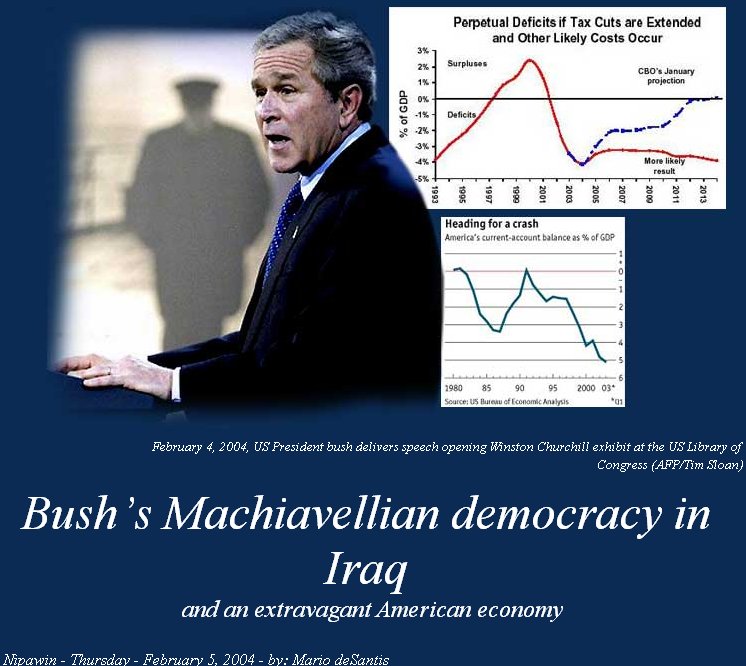Learning Stories
by
Mario deSantis
mariodesantis@hotmail.com
“I am a Canadian, free to speak without fear, free to worship in my own way, free to stand for what I think right, free to oppose what I believe wrong, and free to choose those who shall govern my country.” - -The Rt. Hon. John Diefenbaker, Canadian Bill of Rights, 1960
“The whole judicial system is at issue, it's worth more than one person.”--Serge Kujawa, Saskatchewan Crown Prosecutor, 1991
“The system is not more worth than one person's rights.”--Mario deSantis, 2002
Ensign Stories © Mario deSantis and Ensign
|
|
"The minority, the ruling class at present, has the schools and press, usually the Church as well, under its thumb. This enables it to organize and sway the emotions of the masses, and make its tool of them."--Albert Einstein I finished my last article I wrote last Monday with the social understanding we must not do business as usual. In particular, we cannot continue with the saga to cover up President Bush’s lies with independent investigative commissions appointed by Bush. The war against Iraq was not a war of need; instead it was a war of choice. The fact that the Bush administration is now justifying this war because they were able to remove a tyrannical dictator and bring democracy to Iraq doesn’t make sense. First, I don’t believe in the Machiavellian principle that the ends justifies the means. Second, I don’t believe that Bush has exported free market and democracy in Iraq and in this respect I don’t think American foreign policies are sound enough they can export markets and democracy anywhere in the world. Amy Chua, professor at Yale Law School, states:
I must say that I believe more to Chua’s understanding of markets and democracy in international affairs rather than to the rhetoric of markets and democracy as expressed today by President Bush at the Library of Congress in Washington. The Lou Dobbs’s show on CNN has an ongoing lamentation against American jobs being exported overseas to developing countries, including India and China. It is true that there needs to be a better leveling field in international labour, human rights, and environmental standards. It is also true that we need fairer exchange rates among foreign currencies. But such international considerations are not enough to offset the competitive advantage of the fractional wages in developing countries. We have already mentioned in other articles that there needs to be a shifting of importance from the pursuing of higher Gross Domestic Product numbers to the pursuing of full employment, and from the pursuing of higher productivity gains to sustainable purchasing power. Also, we must understand that the structural economy has changed in the last 30 years; as a consequence, the finance and service industries have today a greater participation in the GDP than they did before. This is happening at the expense of the manufacturing industry. In a nutshell, the American economy has led an understandable hegemonic exploitation of the Free Market at the expense of developing countries and this is why the United States is experiencing progressively larger international trade deficits along with a disparity between the rich and the poor. Economist Su Jingxiang charges the United States with having an extravagant economy. Dr. Su says:
By the way, one most threatening concern is the hegemonic and extravagant U.S. military budget. References Pertinent articles published in Ensign Holland, Steve Bush Says Will Appoint Iraq WMD Commission February 2, 2004 Reuters, http://news.findlaw.com/news/s/20040202/iraqusabushdc.html White House President Bush Discusses Importance of Democracy in Middle East;Remarks by the President on Winston Churchill and the War on Terror February 4, 2004 http://www.whitehouse.gov/news/releases/2004/02/20040204-4.html Eakin, Emily On the Dark Side of Democracy (PDF) January 31, 2004 The New York Times, http://www.nytimes.com/2004/01/31/arts/31CHUA.html?th=&pagewanted=print&position= Su Jingxiang Trade deficit originates in US extravagance February 3, 2004 People's Daily, http://www.chinastudygroup.org/index.php?type=news&id=4586 Kaplan, Fred Trimming the Fat: How to put the military budget on a diet (PDF) February 3, 2004 Slate Magazine, http://slate.msn.com/id/2094872/ |
